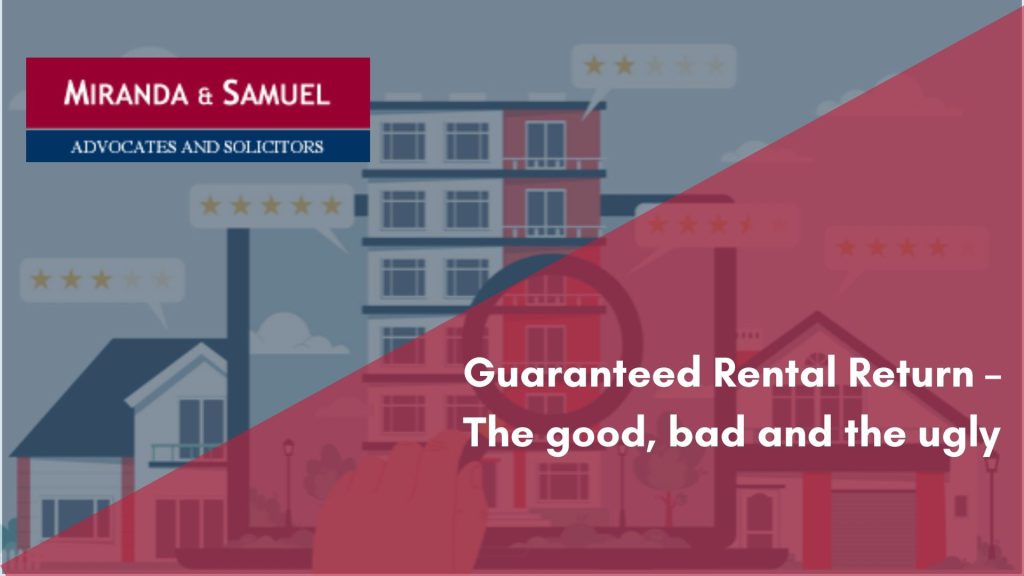The Guaranteed Rental Return (“GRR”) scheme is a type of buy- to-let, leaseback, cash back or own-for-free offer. It is a scheme offered by the housing developer to potential purchasers on yet- to-be-built properties such as condominiums, serviced apartments, hotels, retail malls or vacation properties. Basically, it means that if the purchaser purchased the property from the housing developer, the developer agrees to rent the property out on behalf of the purchaser and pay the guaranteed rental usually ranging from 8%-12% of the purchase price to the purchaser for a stipulated period.
Thus, over the years, GRR schemes have become popular and have attracted many purchasers especially passive purchasers who do not want to get involved with the management of the property yet want to ensure the return on their investment. It is attractive as it assures the purchaser a monthly passive income, without the need to manage the property as the property developer or management corporation would be responsible for the collection of rent.
For the Developer, a GRR has 2 main benefits, it increases the attractiveness of the property and helps give the property investor more confidence.
For the purchaser, it provides income stability, and it simplifies the decision-making process because it offers a contractual guarantee of returns.
However, there is no such thing as a free lunch. Nothing comes without a cost or consequence. Even seemingly complimentary or effortless benefits often entail hidden expenses or trade-offs.
This issue of GRR was considered in the case of Maju Puncakbumi Sdn Bhd v Ch’ng Han Keong [2019] CLJU 1703.
Maju Puncakbumi Sdn Bhd v Ch’ng Han Keong
In this case, a group of owners of a project called “The Arc @ Cyberjaya” took legal action against the housing developer for the GRR scheme. At the time when the purchasers purchased the property, the developer had entered into the Sale and Purchase Agreement (“SPA”) and the Option Agreement for the GRR with the owners, agreed to rent the serviced apartments at the stipulated rate and tenure on behalf of the purchasers. Pursuant to the Option Agreement on the facts, the developer was obliged to pay the monthly rental on a quarterly basis, and the payment would be due on the 1st day of the fourth month. However, in the middle of 2016, the developer defaulted on the payment of rental for more than 60 days despite a notice of demand being served on them. Thus, the Option Agreement was terminated pursuant to the agreement.
The Plaintiff instituted a representative action on behalf of himself and 137 owners of serviced apartments (‘the owners’) to recover arrears of rental payment from the Defendant pursuant to Option Agreements between the Defendant and the owners.
The Plaintiff also filed for Summary Judgement.
The primary obligations of the Plaintiff and the Defendant in respect of the terms of the payment of rental are reproduced below. In the Option Agreement the Defendant is referred to as the “Vendor”, and the Plaintiff is referred to as “the Purchaser”. The rate of payment of rental as well as the due date of payment is provided in clauses 3.1 and 6.1 (a) of the Option Agreement as follows:
Clause 3.1
“The Vendor shall pay to the Purchaser the rental at the rate stated in Section 4 of the First Schedule hereto (hereinafter referred to as ‘the Monthly Rental’), in arrears on a quarterly basis, the first of such payment shall be made on the first day of the fourth (4th) calendar month from the Commencement Date and thereafter payable quarterly on the first day of the relevant calendar month…”
Clause 6.1 (a)
“During the Term or the Renewed Term (as defined under Clause 9.1 herein), as the case may be, the Vendor hereby agrees and covenants with the Purchaser that the Vendor shall (a) pay or cause to be paid to the Purchaser the Monthly Rental in accordance with the Term hereof”.
Pursuant to clauses 3.1 and 6.1 (a) of the Option Agreement, the Defendant was obliged to pay the monthly rental once in every three months, and at the end of the third month, payment would be due on the 1st day of the fourth month. Thus, the due date for payment of rental was on the 1st day of the relevant calendar month every three months i.e. quarterly.
The Plaintiff had instituted this on the allegation that the Defendant had defaulted in the payment of rental to the Plaintiff and the 137 owners for a continuous period of not less than 60 days in breach of clause 10.5 of the Option Agreements.
Clause 10.5 provides as follows:
“If the Vendor fails to pay the Monthly Rental or the Revised Rental (as the case may be) in the manner and time as provided herein or as may be agreed upon between the parties hereto for a continuous period of not less than sixty (60) days, the Purchaser shall give notice in writing (“said notice”) specifying the Vendor’s aforesaid breach and requiring the Vendor to remedy such breach within thirty (30) days from the date the Vendor receipt of the said Notice (“Extended Payment Period”) subject to payment of interest of eight per centum (8%) per annum on the outstanding sum calculated on a daily basis from the first (1st) day of the Extended Payment Period until the Purchaser’s receipt of the outstanding sum from the Vendor and if the Vendor fails to remedy the said breach within the aforesaid period, then the Purchaser shall be entitled to terminate this Agreement whereupon the Vendor shall be liable to pay to the Purchaser a sum equivalent to the Monthly Rental or the Revised Rental (as the case may be) for the remaining period of the Term or the Renewal Term (as the case may be) as agreed liquidated damages.”
One preliminary matter to be decided by the court was whether the representative action by the Plaintiff and 137 other owners was proper. The court held that as the owners had entered into Option Agreement with the Defendant. All the 137 owners had issued a Letter of Authorisation to the Plaintiff to bring a representative action on their behalf. All the 137 owners have the same cause of action against the Defendant. A representative action such as this would have the benefit of avoiding a multiplicity of claims and saving in terms of time and costs of all parties.
Another issue was whether the claim for liquidated damages contravened s75 of the Contracts Act 1950. Court held that there is no issue of whether the Plaintiff’s claim for the unexpired term of the Option Agreement is against section 75 of the Contracts Act.
It is clear from the evidence that the Defendant had defaulted in payment of rental to the owners for a period of not less than 60 days. Notices of Demand had been served on the Defendant. On the failure of the Defendant to remedy the breach on the expiry of 60 days after the notice, a Notice of Termination had been served on the Defendant in compliance with clause 10.5 of the Option Agreement. Thus, the Option Agreement had been terminated and the issue of the Plaintiff’s claim for the unexpired term does not arise.
The next issue was whether the Option Agreement was valid. Two statutes were relevant for consideration, Housing Development (Control and Licensing) Act 1966 and Housing Development (Control and Licensing) Regulation 1989 and the Contracts Act 1950.
The Option Agreement did not contravene the Housing Development (Control and Licensing) Act 1969 and Housing Development (Control and Licensing) Regulation 1989. Both legislations have specific purposes. This was to supervise and monitor development, construction, sale and delivery of premises from the developer to the purchaser. The Option Agreement for the rental of premises is not against public policy and therefore does not contravene section 24 of the Contracts Act. The Option Agreement was entered into voluntarily for mutual benefit of the parties. It is not immoral or illegal as to contravene section 24 of the Contracts Act.
The court awarded the owners RM3.97 million comprising the outstanding rentals until May 2017 and 8% interest on the outstanding rentals, agreed liquidated damages, general damages, exemplary damages and 5% interest on the overall damages. The developer’s appeal was dismissed by the Court of Appeal.
Points to take note of
1. The GRR is generally a valid and enforceable guarantee scheme. The purchasers have the full protection of the law, in the event of a breach. The developers liability is based on the contractual terms.
In Maju Puncakbumi’s case, even though the agreement was drafted by the Developer, the terms of the Option Agreement contained clauses onerous to the developer, including the purchasers having the right to terminate for nonpayment of rental, and claim payment of the rental due for the full remaining term.
This will have far reaching cash flow consequences for the developer. An alternative would have been for the agreement to only allow the repayment of the unpaid rental, together with penalty interest for the delay.
2. The GRR Agreement it is not part of the SPA
The SPA is regulated by the Housing Development (Control and Licensing) Act 1966 and Housing Development (Control and Licensing) Regulation 1989. It is a separate contract between the purchasers and the developer. Thus, the aggrieved owners are not allowed to file their case with the Housing Tribunal as the Tribunal has no scope and jurisdiction to hear their case. The case must be filed in civil courts.
3. Counter party risk
The creditworthiness of the counter party. If the developer is a strong and reputable developer, this risk is minimal. However, the legal protections become less certain if such GRR scheme is contracted by a 3rd party marketing or subsidiary company with limited assets. Also, if the property developer falls into liquidation, the GRR is an unsecured debt, with low priority in repayment that will only be paid if there are assets remaining.
By George Miranda , Joy Sam Jia Qian, Kong Chai Yin
This article is for general information purposes only and does not constitute legal or professional advice. It should not be used as a substitute for legal advice relating to your particular circumstances. Please note that the law may have changed since the date of this article.




